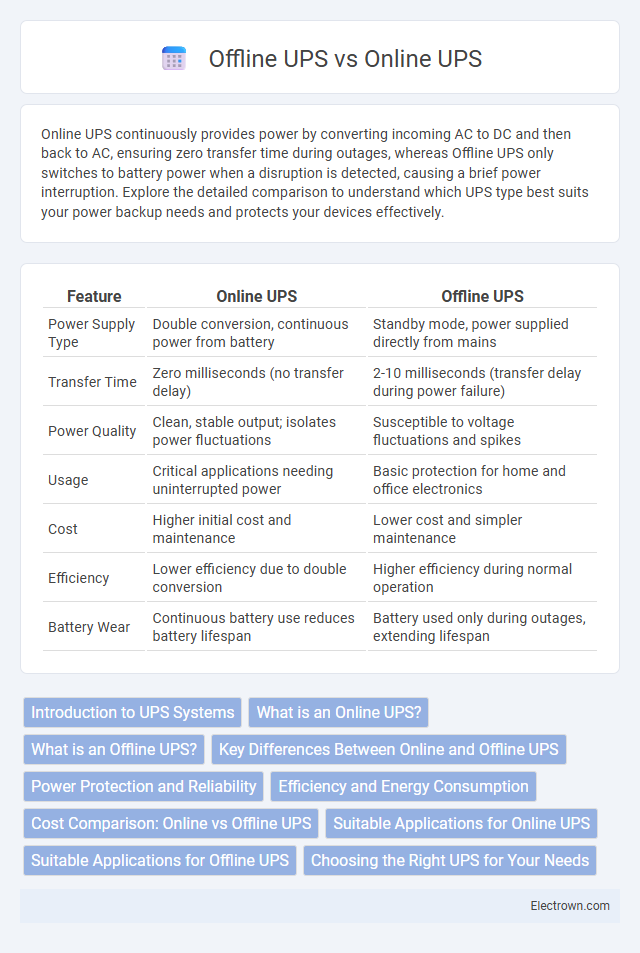Online UPS continuously provides power by converting incoming AC to DC and then back to AC, ensuring zero transfer time during outages, whereas Offline UPS only switches to battery power when a disruption is detected, causing a brief power interruption. Explore the detailed comparison to understand which UPS type best suits your power backup needs and protects your devices effectively.
Table of Comparison
| Feature | Online UPS | Offline UPS |
|---|---|---|
| Power Supply Type | Double conversion, continuous power from battery | Standby mode, power supplied directly from mains |
| Transfer Time | Zero milliseconds (no transfer delay) | 2-10 milliseconds (transfer delay during power failure) |
| Power Quality | Clean, stable output; isolates power fluctuations | Susceptible to voltage fluctuations and spikes |
| Usage | Critical applications needing uninterrupted power | Basic protection for home and office electronics |
| Cost | Higher initial cost and maintenance | Lower cost and simpler maintenance |
| Efficiency | Lower efficiency due to double conversion | Higher efficiency during normal operation |
| Battery Wear | Continuous battery use reduces battery lifespan | Battery used only during outages, extending lifespan |
Introduction to UPS Systems
Online UPS systems provide continuous power conditioning and zero transfer time during outages by continuously converting incoming AC power to DC and then back to AC, ensuring consistent voltage and frequency output. Offline UPS systems, also known as standby UPS, remain idle during normal operation and switch to battery power only when a power failure is detected, resulting in a brief transfer time. Your choice depends on the critical nature of your equipment, with online UPS offering superior protection for sensitive electronics.
What is an Online UPS?
An Online UPS (Uninterruptible Power Supply) provides continuous power by converting incoming AC power to DC and then back to AC, ensuring zero transfer time during power interruptions. It offers superior voltage regulation and protection against power surges, making it ideal for sensitive electronic equipment and critical systems. Unlike Offline UPS, Online UPS maintains a constant power supply regardless of input anomalies, delivering higher reliability and power quality.
What is an Offline UPS?
An Offline UPS, also known as a standby UPS, provides basic power protection by supplying battery power only during a power outage or voltage drop, ensuring uninterrupted operation for connected devices. It operates by directly passing utility power to the load until a disturbance is detected, at which point it switches to battery power, with a brief transfer time. Offline UPS systems are typically used for desktop computers, home electronics, and small office setups where power fluctuations are infrequent and short-lived.
Key Differences Between Online and Offline UPS
Online UPS provides continuous power by rectifying AC to DC and then inverting back to AC, ensuring zero transfer time during power outages and superior voltage regulation. Offline UPS, also known as standby UPS, switches to battery only when mains power fails, resulting in a brief transfer time and less effective voltage regulation. Online UPS offers better protection for sensitive electronics, while Offline UPS is more cost-effective for less critical applications.
Power Protection and Reliability
Online UPS systems offer superior power protection by continuously supplying clean, uninterruptible power through double conversion technology, effectively isolating your devices from voltage fluctuations, power surges, and outages. Offline UPS units provide basic protection by switching to battery power only during outages, which may result in brief power interruptions and less reliable voltage regulation. For critical applications requiring consistent, high-quality power and maximum reliability, an online UPS is the preferred choice.
Efficiency and Energy Consumption
Online UPS systems maintain continuous power flow through double conversion, resulting in higher energy consumption but superior power quality and consistent voltage output. Offline UPS units consume less power by switching to battery backup only during outages, offering improved efficiency during normal operations but risking brief power interruptions. Choosing your UPS depends on balancing energy efficiency needs with critical load protection requirements.
Cost Comparison: Online vs Offline UPS
Offline UPS systems typically cost less upfront than online UPS units, making them a more budget-friendly option for basic power protection needs. Online UPS devices, with their continuous power conditioning and zero transfer time, come at a higher price but offer enhanced reliability for sensitive or critical equipment. Your choice should balance cost considerations with the level of power quality and backup performance required for your applications.
Suitable Applications for Online UPS
Online UPS systems are ideal for critical applications requiring constant power without interruption, such as data centers, medical equipment, and industrial processes. They provide seamless power conditioning and zero transfer time during outages, ensuring your sensitive devices remain protected. These features make Online UPS the preferred choice for environments where power quality and reliability are paramount.
Suitable Applications for Offline UPS
Offline UPS systems are ideal for environments with minimal power fluctuations where basic battery backup is sufficient, such as small offices, home computers, and point-of-sale terminals. These UPS units are suitable for applications that do not require continuous power conditioning but still need protection from power outages and surges. Your choice of an offline UPS is practical for cost-sensitive scenarios where reliability during brief power interruptions is the primary concern.
Choosing the Right UPS for Your Needs
Online UPS systems provide continuous power conditioning and zero transfer time, making them ideal for sensitive equipment requiring uninterrupted power and clean voltage. Offline UPS units are cost-effective solutions suited for less critical devices, offering basic backup capabilities during power outages with brief switch-over delays. Evaluating power sensitivity, budget constraints, and acceptable transfer times helps determine the most suitable UPS type for specific applications.
Online UPS vs Offline UPS Infographic

 electrown.com
electrown.com